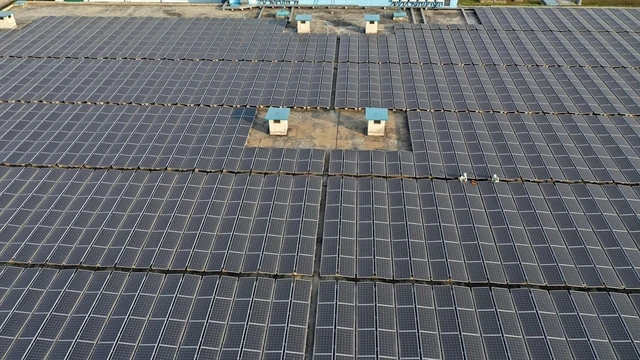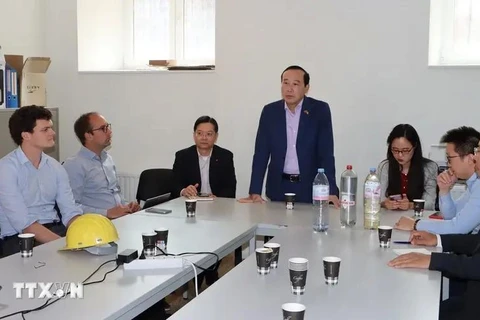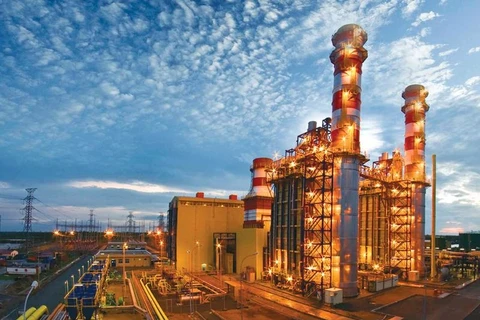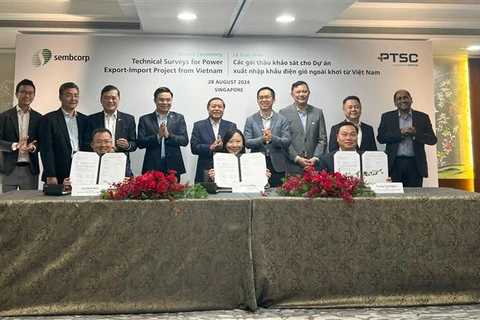
Hanoi (VNS/VNA) - Vietnam needs to consider the development of battery energy storage system (BESS) while the country is on a path towards promoting renewable energies to ensure energy security and sustainable development, experts have said.
According to the Institute of Energy under the Ministry of Industry and Trade, Vietnam’s power system needs BESS at both renewable energy generators and the national power grid.
The 8th National Power Development Plan (PDP8) has taken into account the high integration rate of renewable energy into the power system with a goal that Vietnam’s power system will have 2,700 MW storage of energy by 2030, including 2,400MW of pumped-storage hydropower and 300MW of battery energy storage.
Among 2,400 MW storage of pumped-storage hydropower, currently there is only one plant – Bac Ai – with a capacity of 1,200 MW and that is under construction, while no other projects are on the horizon, meaning that they, if any, are unlikely to be operational by 2030.
Thus, BESS with convenience and flexibility might be an alternative to make up for the shortage of pumped-storage hydropower. BESS does not generate electricity but only stores it and realises it when needed.
The Institute of Energy reported that countries including the US, Thailand, China and India are preparing legal frameworks and technical regulations so that BESS can participate in their power systems at different levels.
According to the National Power System and Market Operation One Member Limited Liability (NSMO), under the current power system, when the capacity of renewable energies (including hydropower) reaches 44% of maximum power (Pmax) during normal days and 88% of Pmax during holidays, the system is at high risk.
A study of the Hanoi University of Technology showed that the cost for BESS is much lower than mobilising power from sources such as gas turbine engines or diesel.
Deputy director of Vu Phong Energy Group Pham Dang An said BESS would play an important role in optimising and stabilising renewable energy sources. The storage system would not only help reduce pressure on the national grid but also ensure continuous and stable power supply.
It was necessary to raise policies in terms of financial support and technical standards to promote the development of the energy storage system, ensure its quality and safety, An said.
According to Ha Duong Minh, a researcher at the International Centre for Development and Environment (CIRED) in France, the BESS installation and operation is a significant barrier to applying this technology.
It is estimated that the electricity price in Vietnam must be more than 0.18 USD per kWh, around two times higher than the current rate, to be profitable with investment in BESS.
However, he pointed out that the cost for BESS was dropping sharply and was expected to fall from 578 USD per kWh to 264 USD per kWh by 2030.
BESS would bring significant benefits, including improving performance, reliability, power management and grid stability, he said.
Minh pointed out that until now, there was no BESS system in operation in Vietnam, except a 700 kW/2 MWh of Power Engineering Consulting Joint Stock Company 2 (PECC2) and under-construction Bac Ai pumped-storage hydropower plant.
Under PDP8, BESS is expected at 300 MW while the renewable energies will develop rapidly, including 21 GW onshore power, 7 GW offshore power and 18-20 GW solar power, raising concerns about whether it is enough to offset the volatility of renewable energy sources, according to Duong.
“The prospect of BESS in Vietnam appears modest in the near future but the long-term outlook paints a completely different picture,” he said.
The PDP8 targets that the capacity of pumped-storage hydropower and battery storage will reach about 30,650-45,550 MW by 2050 to catch up with the high proportion of renewable energy.
“With appropriate policies and investments, BESS might transform Vietnam’s energy landscape, making it more sustainable, stable and reliable,” Minh said.
The flexibility of BESS makes it suitable for a wide range of scales and businesses, from Vietnam Electricity to renewable energy developers as well as electricity consumers, he said.
To ensure efficiency in implementation, Minh said an integrated approach for all relevant parties is needed, in which the Government must take the leading role in establishing a policy framework that includes clear guidance and market mechanism that align interests of the private sector and market demand.
According to energy expert Dao Nhat Dinh, it is necessary to raise incentive policies to promote the development of BESS.
First, BESS should be developed at projects of EVN. Later, when the retail electricity prices are higher, private investors should be encouraged to invest in BESS and participate in the power market.
According to Siemens Energy, energy storage is critical to decarbonising the power system and reducing greenhouse gas emissions. It’s also essential to build resilient, reliable and affordable electricity grids that can handle the variable nature of renewable energy sources./.






















